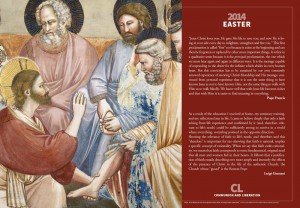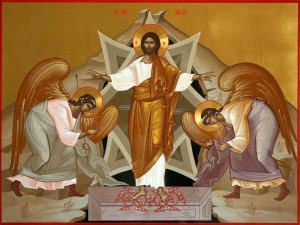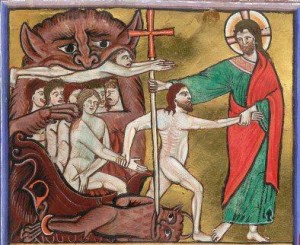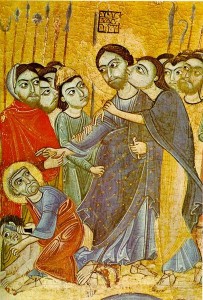 Here is this year’s Easter Poster from Communion and Liberation, the concrete place in the Church where I adhere to Christ.
Here is this year’s Easter Poster from Communion and Liberation, the concrete place in the Church where I adhere to Christ.
I wonder were I will savor the Presence of Christ in the 50 days of Easter.
Mutual prayers.
 Easter Monday brings with it a new emphasis changing the old into new: old leaven is out, and new leaven brought in; new gifts recognized and offered to the Lord for the work of building up the Church. “Clear out the old yeast, so that you may become a fresh batch of dough.” (I Corinthians 5:7) Easter Monday is the second day of a new beginning.
Easter Monday brings with it a new emphasis changing the old into new: old leaven is out, and new leaven brought in; new gifts recognized and offered to the Lord for the work of building up the Church. “Clear out the old yeast, so that you may become a fresh batch of dough.” (I Corinthians 5:7) Easter Monday is the second day of a new beginning.
At Easter we sing this verse: “This is the day The Lord has made; let us be glad and rejoice.” As people baptized into the Resurrection we can say: “You and I are the people the Lord has made; let us be glad and rejoice.”
Easter manifests God’s love that is more powerful than death. It’s a liberation: Easter means death no longer enslaves us. Our early Christians saw the light of Jesus Christ bursting forth from the tomb, a light that shatters of death’s bond.
The Resurrection from the dead is God’s great gift of salvation given to us. One theologian writes that the “Resurrection, God ratifies, sums up, and valorizes his material creation. Therefore, Jesus’ resurrection from the dead is not just about him. It’s about all those who will participate in his Mystical Body, the Church, and it’s about all of matter. In raising Jesus bodily from the dead, the Father is raising all of matter to new life.”
The Resurrection of Jesus from the dead speaks to us as been given a New Creation radically changing the sin of Adam into a new heaven and a new earth, a new body: we are living creatures living within the life of God. In Christ Jesus we are human beings with an alive, flourishing humanity. Christians believe that heaven is not just a spiritual space that our souls go following death. It’s first a new creation on earth with the doors of heaven opened unto new life with the Holy Trinity.
 Jesus has gone to search for our first parent, as for a lost sheep. “Awake, O sleeper, and rise from the dead, and Christ will give you light!”
Jesus has gone to search for our first parent, as for a lost sheep. “Awake, O sleeper, and rise from the dead, and Christ will give you light!”
An ancient homily for Holy Saturday: “Something strange is happening – there is a great silence on earth today, a great silence and stillness. The whole earth keeps silence because the King is asleep. The earth trembled and is still because God has fallen asleep in the flesh and he has raised up all who have slept ever since the world began. God has died in the flesh and hell trembles with fear…”
 I know a priest who tells me that Good Friday is a day for us who to gaze upon the crucifixion as an attraction to self-consummation. Moreover, it is a day of panic at the threat of annihilation. The Cross of Jesus is a most power reality. It is not a decoration.
I know a priest who tells me that Good Friday is a day for us who to gaze upon the crucifixion as an attraction to self-consummation. Moreover, it is a day of panic at the threat of annihilation. The Cross of Jesus is a most power reality. It is not a decoration.(Fr. Giussani Is It Possible to Live This Way? Vol 2, Hope)
Holy Thursday is a day of recognition of what is really at stake: the self-gift of Love given to the world . It is a day of God’s promise of being present to us until the end of human time. Holy Thursday is a day in which a body is given to the Church: the Body of the Savior– the Body given to us is given to us in an ultimate way. This is eucharistic.
I suspect if we are honest with ourselves during the year we would admit that we are persons in need, persons who live with a sensibility of longing. There is a certain anguish over our limitations and the capacity of others to receive.
 Flannery O’Connor is a rather intriguing and an important Catholic woman of importance for us today. She is too often overlooked by Catholics and secularists alike and that is a sad point. George Weigel wonder aloud on several critical points about faith and reason, and faith, but he also opines about the lack of a concerted study of O’Connor’s sanctity. Is Weigel asking something important here?
Flannery O’Connor is a rather intriguing and an important Catholic woman of importance for us today. She is too often overlooked by Catholics and secularists alike and that is a sad point. George Weigel wonder aloud on several critical points about faith and reason, and faith, but he also opines about the lack of a concerted study of O’Connor’s sanctity. Is Weigel asking something important here?
You need to read Weigel’s most recent article, “Easter with Flannery O’Connor” because brings to light some new aspects of O’Connor’s witness to truth that I have not heretofore thought about in detail.
Weigel’s opening paragraphs read (to read the full article click on the link above):
This coming Aug. 3 will mark the golden anniversary of Flannery O’Connor’s “Passover,” to adopt the biblical image John Paul II used to describe the Christian journey through death to eternal life. In the 50 years since lupus erythematosus claimed her at age 39, O’Connor’s literary genius has been widely celebrated. Then, with the 1979 publication of The Habit of Being, her collected letters, another facet of Miss O’Connor’s genius came into focus: Mary Flannery O’Connor was an exceptionally gifted apologist, an explicator of Catholic faith who combined remarkable insight into the mysteries of the Creed with deep and unsentimental piety, unblinking realism about the Church in its human aspect, puckish humor—and a mordant appreciation of the soul-withering acids of modern secularism.
Insofar as I’m aware, there’s never been an effort to initiate a beatification cause for Flannery O’Connor. If such a cause should ever be introduced, The Habit of Being (and the lectures found in the Library of America edition of her collected works) should be the principal documentary evidence for considering her an exemplar of heroic virtue, worthy to be commended to the whole Church.
 Today, the Latin Church has the gospel of Judas betraying Jesus (see previous post today) and the Byzantine Church will chant the story of Jesus being anointed at Bethany. For me, this is another aspect of the Mystery of the Incarnation.
Today, the Latin Church has the gospel of Judas betraying Jesus (see previous post today) and the Byzantine Church will chant the story of Jesus being anointed at Bethany. For me, this is another aspect of the Mystery of the Incarnation.
Another theological way of discerning the meaning of today’s witness before the Lord is that the Church is asking us to attend anew to the interior life where we are asked to have a singularity in the way we live God’s grace: how well have we lived our vocation? The converse to this aspect of interiority is that you and I have a certain terror in being the only one responsible for persons and works. This flip side can lead us to the rejection of life in the Garden of Eden (paradise).
The Judas event and the Lord’s anointing at Bethany have different thrusts, but the emphasis is the same: love breaks the chain of sin and division. Perfect Love does so in supreme way in drawing our heart to a new level of awareness.
This poetic text sets the stage for us.
O Lord, the woman who had fallen into a multitude of sins,
recognized Your divinity and joined the ranks of the myrrh-bearings.
Before Your burial, she offers You myrrh with her tears.
“Alas,” she says, “the stinging night of pleasure seizes me;
the dark and moonless love of sin grasps me.
Accept the stream of my tears and my copious weeping,
for You make the waters fall from the clouds into the sea.
Incline Your ear to the cry of my heart,
for You incline the heavens in Your ineffable condescension.
Allow me to kiss Your most pure feet,
drying them with the locks of my hair;
for these are the feet that Eve heard in Paradise,
and, trembling at Their approach, she hid herself.
O Lord, who can search out the number of my sins?
Who shall search the depth of Your judgments,
O God our Redeemer and the Savior of our souls?
In Your infinite love, do not despise Your servant.”
 The day before Holy Thursday is known by Catholics as Spy Wednesday. It is a day of profound aloneness. In the biblical and liturgical narrative of the Paschal Mystery we recall that the Apostle Judas played an essential part in our redemption, that sin and betrayal are at the heart of the Christian mystery of salvation just as grace, love and forgiveness.
The day before Holy Thursday is known by Catholics as Spy Wednesday. It is a day of profound aloneness. In the biblical and liturgical narrative of the Paschal Mystery we recall that the Apostle Judas played an essential part in our redemption, that sin and betrayal are at the heart of the Christian mystery of salvation just as grace, love and forgiveness.
The Biblical and theological roots of our faith gives us a striking opportunity to discern, to re-evaluate, re-direct our life. We call this the journey of conversion; we have the sacraments of Confession and Eucharist; we also have the tools of spiritual direction to see where God is leading us, or where we have not lived according to Catholic faith. This ability to think again, to have a metonoia, is a supreme grace because all of us have something of Judas in us.
How many of us think we are doing the right thing when in the final analysis our actions were not. Judas’s betrayal of Jesus was in this category. The expectation Judas had hoped for was a Messiah who would liberate Israel from Roman rule thus creating a new Jerusalem, a new creation, a new people. We know he was wrong, and that the devil presents bad things as good. The devil prevailed upon the freewill of Judas but twisting reality in his deception. The Apostle Judas failed to understand, as likely did the others, that Jesus wasn’t interested in earthly power.
The other important aspect of Judas and Spy Wednesday is our awareness of how evil works in the world. It is a reality and not fake. Evil has a real grip on our lives and can redirect our focus from God unto ourselves or materialistic tendencies that ultimately reject God. Pope Benedict spoke of a lack of awareness regarding evil when he said in one of his teachings, “Today there is a certain callousness of the soul towards the power of evil, an insensitivity to all the evil in the world: we do not want to be disturbed by these things, we want to forget, perhaps, we think, it is not important. It is not only insensitivity to evil, but also insensitivity to God.”
Spy Wednesday is an important day in our approach salvation. Hence, it cannot be treated as frivolous or disregard of the betrayal it points to. It is said that Saint Catherine of Siena worried about Judas’s fate but was told by the Lord that mercy was possible even for him.
Sometimes I am surprised how quickly we rush to rule the world with justice. Or, I should say some form of justice that is so harsh and decisive. I wonder if we are aware that our manner of being just is not God’s. For example, man and woman often determine who is and who is not in hell. Ours is a sentimental mercy. It is a common assessment that Judas is in hell. But, is this a matter of our business? Perhaps we ought to take Saint Catherine’s testimony as true. Biblical revelation tells us that only God determines the content of one’s heart. The Church’s teaching is that the Lord gave the power discern who is in communion, or not, with God (“the power of the keys”). I recall the famous line from Cardinal Avery Dulles who said we know hell exists but not the population of hell.
Today, Spy Wednesday, let us pray for those who have betrayed or been betrayed. As difficult as this is, praying for our enemies is exactly what Jesus would do. Let us pray for God’s mercy on Judas. Today, go to confession.